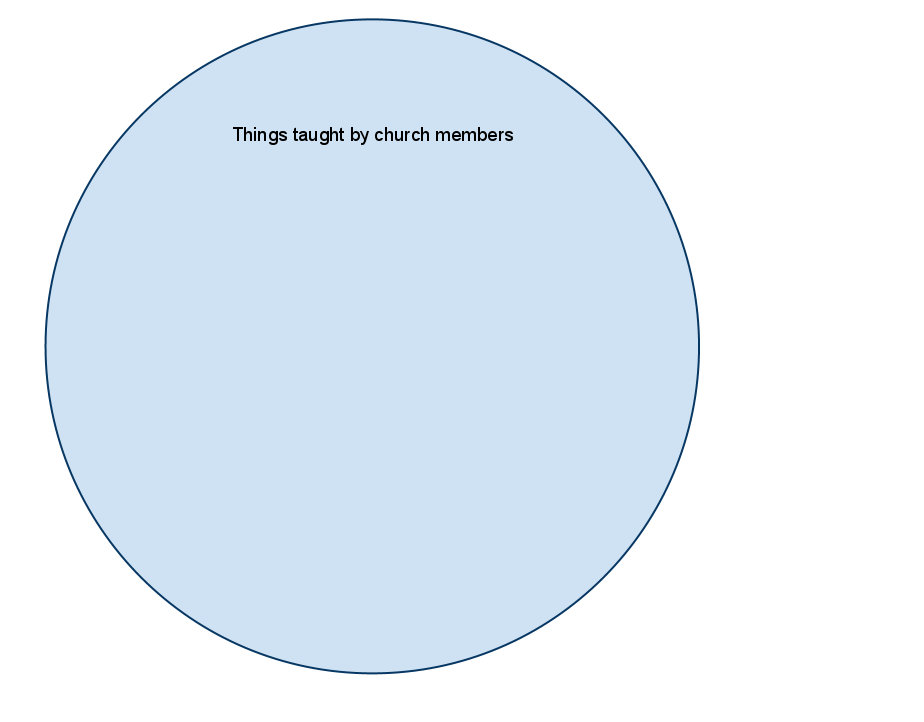Category: Cornucopia
-
Skanky Legs
Women, celebrate. You no longer have to wear pantyhose in order to maintain an appropriate standard of modesty. And, yes, you did until this week. Discuss.
-
Faith, Philosophy, Scripture: Literally
Ironically, the trouble with biblical literalism is that it doesn’t take the word “literal” literally.
-
Resolving Disharmony in the Church
NOM = “new order Mormon” — a general term for people who self-identify as Mormon, yet maintain unorthodox beliefs or practices. I mention this because there’s a bit of drama going on right now with John Dehlin. John is one of the most well-known church members associated with the NOM world (he does the Mormon…
-
Prove Me Wrong
I’m still not satisfied with how my two posts on doctrine and policy have wrapped up, so let me come back to that for one more minute. In those posts, I said that when members attempt to define doctrine, they essentially end up with “doctrine” meaning “things I agree with”. My attempt to get around…
-
Tasteful Nudity
In one of the strangest Fast Sunday testimonies I recall from my youth, a member of the ward spoke about his recent trip to Las Vegas (or was it Reno?) He’d gone down there with some other church members, and they had seen one of the shows. He went into the show somewhat naively, and was…
-

Increasing Agency, and the Healer
Does winning the lottery increase your agency? In my “Forms of Agency” post, I said yes. After all, the lottery winner suddenly has more resources, which leads to more choices, and isn’t agency about choice? But now that I’ve thought on it some more, I’d like to give a more nuanced response. Imagine that you…
-
God and Baby Face Nelson: Thoughts on Obedience, Genocide, and Problematic Narratives
How should church members today approach morally repugnant scriptural narratives? I wondered about that as I recently read over Elder Hales’ talk about agency and obedience. There was a lot in the talk which I liked. I do think that order and consistency can absolutely be useful for faith communities (for instance, in helping establish…
-
Barrack Obama, Osama bin Laden, and the Kids Eat Corn Pops
I’m sure you’ve heard the news — Osama bin Laden has been killed, and his body is held in the United States. I’m not someone who can speak insightfully to the political, military, or diplomatic facets here. I’m just a guy who was on the phone with his wife when she said, “Hey, it looks…
-
More on the Mormon Gender Gap
Once upon a time, I wrote a post titled “The Puzzling Mormon Gender Gap.” It is still puzzling, primarily because it seems so inconsistent with the popular picture of the Church as a patriarchal institution run by old white males. When the topic came up recently in a ZD thread, the ZD discussants (generally a…
-

“Policy” and “Doctrine”, This Time with Venn Diagrams!
Here’s the circle that represents everything taught by church members, from the uncontroversial (like faith and repentance) to the bizarre (“King Arthur lost the priesthood for not listening to Merlin”): Now let’s add another circle for things taught by General Authorities. Every GA is a member of the church, so this circle is entirely encompassed…
-
On the Proper Usage of “Policy” and “Doctrine”
We’ve enjoyed (or endured) countless discussions about which church teachings are “doctrines” and which are merely “policies”. Here’s my two cents: “policy” and “doctrine” aren’t opposites — they’re not even on the same axis. Doctrines are beliefs that are taught (in fact, the word “doctrine” comes from the Latin for “teachings”, suggesting that any belief…
-

NT Lesson 18 (JF): Luke 15, 17
Luke 15 As I learned from Bruce Jorgensen, it is important to read the parables of Luke 15 together. Consider the setting that Luke gives us in verses 1-2 and then imagine Jesus telling each of these parables in response to what happens in those verses: he hears the Pharisees and the scribes complaining because…
-

NT Lesson 17: Mark 10:17-30; 12:41-44; and Luke 12:13-21; 14; 16
Given the quantity of material in these chapters, rather than try to cover everything, I will focus my questions on the verses from Mark and selections from the verses in Luke. As you read this material, be sure to ask how it applies to us who live in the latter-days. What do these verses teach…
-
Be Ye Perfect
The gospel instructs us in a certain way of being imperfect. Here, salvation turns on practicing what Elizabeth Bishop calls “the art of losing.” Jesus famously describes this art of losing in Matthew 5:48. “Be ye therefore perfect,” he says, “even as your Father which is in heaven is perfect.” Here, the term “perfection” indexes…
-
Do we still teach homemaking?
A guest post from our friend and colleague emeritus, Russell Arben Fox. The title of this post isn’t a snark; it’s an open question, about which I am genuinely curious. (I’m also giving a presentation on this topic next week at the Midwest Sunstone/Restoration Studies conference, so my ulterior motive is a fishing expedition for…
-

Forms of Agency
Agency is closely linked to power. Without power, we cannot make choices, and without choices we have no agency. It is by our power to help, to learn, to build that we exercise agency. Each of these — helping, learning, building — are forms of agency. (Agency is also closely linked to work and value,…
-
Structures
Not every scholar agrees (as if!), but some identify the following structure in Matthew’s Gospel:
-
Serving God with Our Minds: SMPT Conference This Weekend
This weekend at BYU, the Society for Mormon Philosophy and Theology will hold its 8th Annual Meeting on the theme, “Serving God with Our Minds—The Place of Philosophy, Theology, and Scholarship in a Prophetic Church.” Featured speakers include Patrick Mason, who will soon be taking the Howard W. Hunter Chair of Mormon Studies at Claremont,…
-
What About Portable Temples?
In his Sunday morning session remarks in general conference, President Monson told stories of great sacrifice offered to reach temples for sacred ordinances. He told of those in the Amazon who travel thousands of miles to the temple in Brazil. He told of the dedicated Tahitian man who — with his two sons — spent…
-

NT Sunday School Lesson 15: John 7-8
WARNING: Longer than usual notes. I agree with the generally accepted scholarly conclusion that John 7:53-8:11 is a later insertion into the original text. So I will deal with John 7:1-42 and John 8:12-59 as one narrative, the story of what Jesus does at the feast of the tabernacles. Then I will deal with the…
-
What’s the Scripturefulness Level of Conference?
A few weeks ago, our ward’s Relief Society did a lesson on the fourteen fundamentals of following the prophet. As a result, I now have a copy of them hanging on my refrigerator. Putting away the leftover cheesecake after last night’s games of Magic, my eyes caught on #3: “The living prophet is more important…
-
April 2011 FHEs
Introduction to this series is here. I only prepared three this month in order to leave time for an Easter FHE (one of my favorites is here).
-
Book Review: God So Loved the World: The Final Days of the Savior’s Life
Eric D. Huntsman, God So Loved the World: The Final Days of the Savior’s Life, Deseret Book, 2011.
-
Faith, Philosophy, Scripture: Apocalyptic Theology
Imagine I’ve just been made supreme chancellor of a graduate program in Mormon theology. Thousands of students throng. We need a syllabus. What’s our first reading assignment? We’re going to start with Jim Faulconer’s dramatically subtitled essay “Rethinking Theology: The Shadow of the Apocalypse” from Faith, Philosophy, Scripture (Maxwell Institute, 2010). On my reading, Jim’s…
-
Gospels
Imagine your four favorite meals. Now imagine them cut into bite-sized pieces and combined into one dish.
